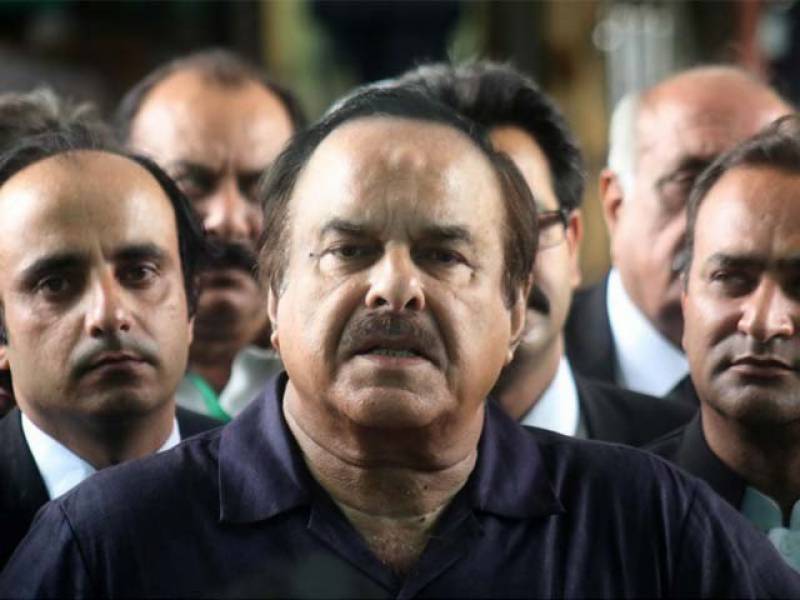Islamabad (Staff Report): Pakistan Tehreek-e-Insaf (PTI) leader Naeemul Haque said on Sunday that Imran Khan may take oath as prime minister at D-Chowk in the federal capital.
“Imran Khan would prefer a peoples ceremony of oath-taking where thousands can watch him take the oath as PM of Pakistan. Perhaps D-Chowk area may be the right place to do it. Let’s hope so. Will keep on updating on this,” Haque said in a Tweet.
IK would prefer a People’s ceremony of oath taking where thousands can watch him take the oath as PM of Pakistan. Perhaps D Chowk area may be the right place to do it. Let’s hope so. Will keep on updating on this.
— Naeem ul Haque (@naeemul_haque) July 28, 2018
On Saturday, Haque said that Khan would take oath as prime minister before August 14.
The Election Commission of Pakistan (ECP) on Saturday announced complete provisional results of the general election held in the country on July 25.
According to details, Pakistan Tehreek-e-Insaf has emerged as the single largest party in the center bagging 115 National Assembly seats, followed by Pakistan Muslim League-Nawaz with 64 seats.
Pakistan Peoples' Party secured 43 seats while number of National Assembly (NA) seats won by the other parties is as above: Muttahida Majlis-e-Amal (MMA) 12, Pakistan Muslim League-Quaid (PML-Q) 5, Muttahida Qaumi Movement-Pakistan (MQM-P) 6, Grand Democratic Alliance (GDA) 2, Awami Muslim League (AML) 1, Pakistan Tehreek-e-Insaniat 1, Awami National Party (ANP) 1 and Balochistan National Party (BNP) 1.
Thirteen independent candidates have also been elected to the National Assembly. Election on two of the total two hundred and seventy-two seats to be directly elected in general election had been postponed.
The ECP also declared the result of seats won by the political parties in the provinces.
Punjab: Out of total 295 Punjab Assembly seats, the results show that PML-N is leading in 129 constituencies of Punjab Assembly followed by PTI with 123 seats and 28 constituencies won by independent candidates. The number of seats won by other parties is: Pakistan Muslim League-Q 7, Pakistan Peoples Party 6, Balochistan Awami Party and Pakistan Awami Raj one each.
Sindh: Pakistan Peoples Party (PPP) is leading with 76 seats out of total 129 seats in Sindh Assembly, followed by PTI 23 and MQM -P 16, GDA 11, TPL.2 and MMA got one seat.
Khyber-Pakhtunkhwa: In Khyber-Pakhtunkhwa (KP), Pakistan Tehreek-e-Insaf (PTI) is leading in 66 constituencies out of total 97 followed by MMA 10, ANP 6, Independent 6, PML-N 5 and PPP got victory in four constituencies respectively.
Balochistan: In Balochistan, the ECP has declared results of 46 Balochistan Assembly seats out of its total of 50.
Balochistan Awami Party (BAP) is leading in 15 constituencies followed by MMA with 9 seats. Balochistan National Party six, ANP and Balochistan National Party (Awami) three each, Hazara Democratic Party two, and PML-N and Jamhoori Watan Party could get one seat each.
Five independent candidates have also been elected to Balochistan Assembly.
Over 12,570 candidates were in the run for seats of National and four provincial assemblies.
Against the National Assembly's seats, about 3,675 candidates were in the electoral race whereas about 8,895 for the provincial legislatures of all four provinces.
According to the data shared by the ECP, 1,696 candidates are vying for the National Assembly's constituencies from Punjab and 4,242 for the provincial legislature.
From Sindh, 872 were contesting for the National Assembly seats and 2,382 for the provincial assembly.
Total contesting candidates for the National Assembly from Khyber Pakhtunkhwa are 760 and 1,264 for the provincial assembly.
For Baluchistan’s National Assembly seats, there were a total of 303 candidates and 1,007 for its provincial assembly seats.
In Islamabad, 76 candidates are in the race for three seats of National Assembly.
According to the electoral rolls, 105.96 million voters were eligible to cast the vote.


